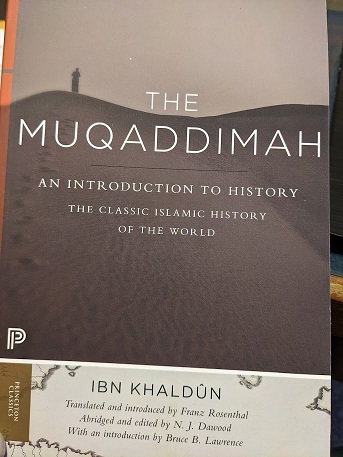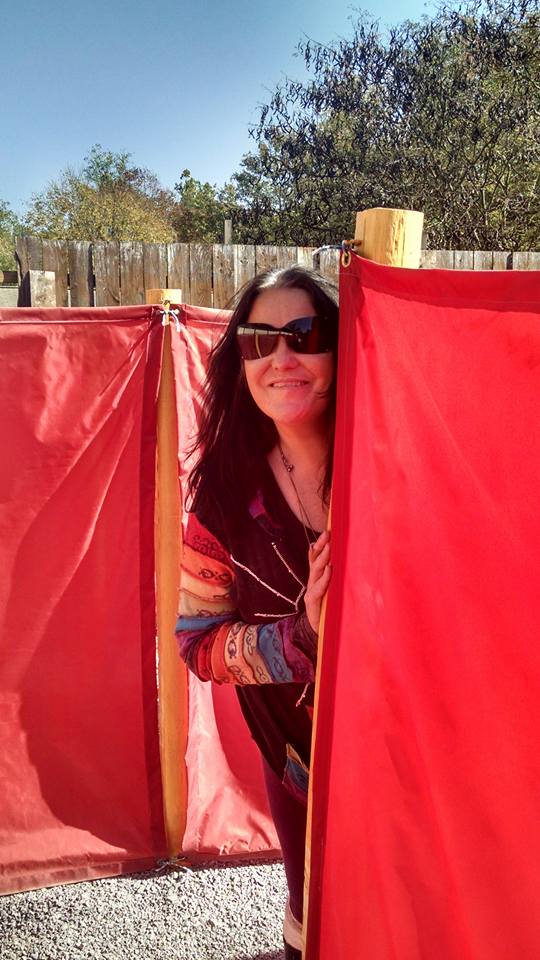A Really Good History Book from about Six Hundred Years Ago

I recently finished The Muqaddimah by Ibn Khaldun, a book which had been part of my tsundoku for some time and which I finally got around to reading in connection to generations theory research. Khaldun’s work is actually referenced in The Fourth Turning, by William Strauss and Neil Howe, in the chapter on archetypes in history. I might have remembered this, but it was only when I rediscovered the fact that I felt compelled to pull The Muqaddimah off my shelf to read it and find the connections.
Khaldun has his own theory of a generational cycle in politics, or at least a generational progression. It’s basically the idea that as the generations pass, the authority of a dynasty declines and eventually disappears altogether. The founding generation establishes and consolidates the authority, and the next generation continues to benefit from it while beginning the process of constricting it. The third generation is just living in the shadow of that authority, even as the dynasty is in its most materially prosperous phase. The fourth and last generation of the dynasty is dissolute and wastes the legacy of the previous generations; at that point the dynastic authority disintegrates.
The parallels to the turnings theory of Strauss & Howe, which also has a four-part cycle and theorizes four generational archetypes, are plain. There’s also a similarity to the cycles of government identified in ancient times by Polybius. It’s fascinating to think that Polybius was writing fifteen hundred years before Khaldun, and Khaldun was writing over six hundred years before our time, and yet these parallels are there, even with modern thinking. It’s like these different scholars writing in different eras are all discovering the same fundamental truths.
Khaldun’s work is comprehensive in its scope (he’s what you would call a polymath) and reminds me a bit of Aristotle, just in the breadth of what he covers and the systematic way he goes about categorizing and explaining things. His work is also reminiscent of Herodotus, in that he writes about historiography and the importance of applying a discerning intellect to the study of history, lest one simply repeat the misinformation that is frequently passed down as historical fact.
While he does echo these ancient Greek philosophers, he is also plainly a denizen of the medieval age. He takes for granted the validity of his religion, Islam, and believes in spiritual reality and supernatural powers (he has a whole section railing against sorcery and its danger to religion). His model of physics is based on the four elements, and his model of biology and medicine is the medieval one of the four humours corresponding to those elements. We might think of these views as scientifically backward, but he’s simply working with what was known in his time, before the advances of the modern era.
What’s truly remarkable about Khaldun’s work is his discourse on social and political science. He has this conceptual framework around which he constructs a theory of how and why civilization forms, and its sources in religious and dynastic authority. In his view, religion forms dynasty and dynasty forms civilization, which sort of marks him as a theocratic medievalist. But you could think of this view as simply the idea that government must be rooted in some kind of moral ground in order to establish its definition of justice.
In his treatise, Khaldun repeatedly invokes the same concepts as he describes civilization in general, and the difference between simple desert civilization and what he calls sedentary civilization with its wealth and cities, basically describing a rural-urban divide. Let’s see if I can do a good job summarizing his theory.
In order for humans to live together cooperatively in a society they need some sort of “restraining influence” to prevent them from simply predating on one another. This influence can come from religion or it can come from the “royal authority” of a ruler. The royal authority of a ruling dynasty derives from “group feeling,” which is like social cohesion within a population, creating mutual esteem and loyalty. At first a dynasty has “desert attitude,” meaning a simple way of life and qualities of toughness and courage. This enables it to prevail over its enemies and establish its rule. But subsequent generations of the dynasty lose the desert attitude as the dynasty develops “sedentary culture.” The dynasty prospers economically, its cities grow in wealth and population and become advanced in the sciences and crafts, but all of this is at the expense of group feeling. Eventually the dynasty falls to some other one which has the desert attitude and group feeling that enable it to achieve military superiority.
It’s clear why Strauss & Howe would have referenced Khaldun, since his analysis has similarities to their turnings theory. You can also see how Khaldun anticipates the future thinking of Western philosophers. While reading The Muqaddimah and encountering his ideas, it occurred to me that the Age of Enlightenment might as well be considered to be the time when Western philosophy finally caught up to Ibn Khaldun. Honestly, encountering these ideas in a book written in the 14th century makes me reconsider the whole concept of a rift between the “medieval” and “modern” ages. It also make me wonder how Khaldun would see our world today, if he were to somehow be here to observe it.
I found The Muqaddimah to be a very easy read. Khaldun writes with confident authority and with common sense, and his thinking is very clear. Credit must go to the translator, Franz Rosenthal, for transforming Khaldun’s Arabic into straightforward English. I’m very happy to add The Muqaddimah to my “Read” bookshelf, from where I’m sure I will keeping referring to it as I continue my studies of generations and history.




